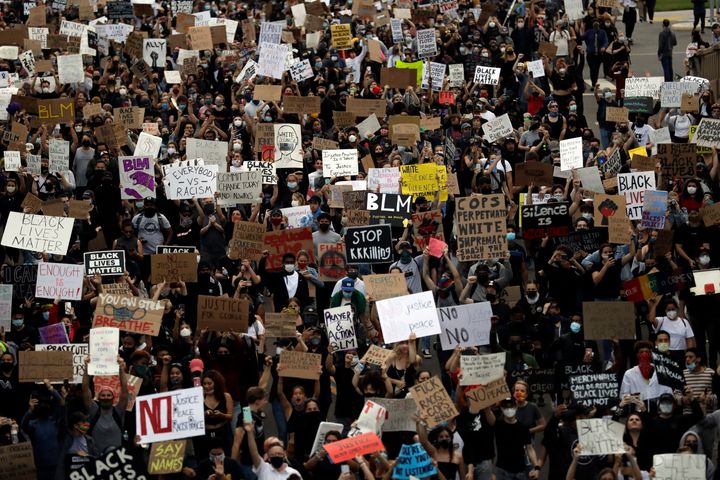
If you’re among the demonstrators protesting police brutality across the state following the recent police killings of George Floyd and Breonna Taylor, you’ll got to consider whether participating can cost you your job.
The First Amendment of the U.S. Constitution gives people the proper to peacefully assemble and protest with their fellow citizens. But if you’re employed for somebody else, the extent of this legal protection depends on when and the way you protest.
“In short, it depends on who you’re employed for and where you reside ,” said Aaron Holt, a Houston-based labor and employment attorney at the firm Cozen O’Connor.
Do you have a public or private employer?
If you’re employed for a public employer, you’re employed for the govt , and you’ve got a right to political speech if it’s a matter of political, social or other concern to the community, Holt said.
Holt cited Connick v. Myers, a U.S. Supreme Court case that established a balancing test for public employees supported whether an employee’s speech was a private grievance or a matter of public importance.
“If it’s a matter of public importance, then the employee’s right to form that speech, to protest, to voice their opinion outweighs the employer’s interest, which is that the government, in maintaining an efficient workplace,” Holt said.
At-will employers can fire you without having much justification.
If you’ve got a personal employer, you’re generally getting to be an at-will employee, which suggests you’ll be terminated for any reason as long as your termination isn’t in violation of other federal, labor and discrimination laws.
“Every state within the nation but Montana is at-will, so unless you’ve got a contract or union negotiation agreement saying otherwise, you’ll be fired for any reason or no reason in the least , including attending protests,” said Donna Ballman, a Florida-based employment attorney and author of “Stand Up for Yourself Without Getting Fired: Resolve Workplace Crises Before You Quit, Get Axed, Or Sue the Bastards.”
That being said, an employee can’t be fired in retaliation for a legally protected action, and in several states like Colorado, ny and North Dakota , employees are shielded from getting fired for lawful activity off the employer’s premises during non-working hours.
California, Colorado, New York, North Dakota and Louisiana even have specific protections for political participation in employees’ off-hours. In these states, “it’s illegal to retaliate against an employee for his or her off-duty participation in politics or political campaigns. So protests are probably covered,” Ballman said.
If certain demographics of employees are being singled out for disciplinary action, being fired for protesting that Black lives matter could even be discriminatory, Ballman said.
“If Black employees are fired for protesting in Black Lives Matter protests, there’s also an argument about race discrimination,” Ballman said. “Discrimination laws still apply to protests, so an employer can’t fire only employees of a particular race, sex, national origin, etc. for participating in protests.”
There are ways to attenuate the danger of jeopardizing your employment.
One practical tip is to protest outside of your working hours. The laws protecting political actions like protesting are centered around what you are doing off the clock, so your employer is within its rights to fireside you if you’ve been protesting while you agreed to be working.
“If you’re on the clock working for the employer, the employer has every right to expect you to be doing the work that you’re being paid,” Holt said.
Because protests are being televised and shared on social media, confine mind that you simply may find yourself on camera. Having an up-front talk together with your boss about your participation might be helpful, said Kyra Leigh Sutton, a person’s resources expert and professor within the Rutgers School of Management and Labor Relations. “The conversation isn’t posing for permission,” Sutton said. “Instead, it’s a chance to share your interests/values together with your managers and provides them a heads–up about your participation.”
If you don’t trust your manager to be supportive, ask somebody else you trust within the organization, so you’ll a minimum of get clearer insight into how the corporate feels about employees protesting. you’ll ask that confidante, “From the attitude of our organization, are there any legal ramifications if I participate within the protests during my personal time?” Sutton advised.
Then consider what you wear to the protest, because your off-duty conduct can still implicate you at work. Sutton suggested staying faraway from wearing the corporate logo while protesting to point out you don’t represent the corporate in your actions.
If a company’s values around protests are different than yours, concentrate thereto signal.
If you are doing determine that protesting against police brutality is against company policy and you disagree, that would be a sign to seem for employment that’s a far better fit.
“If you’re in a corporation that hasn’t supported the protests publicly, distributed informative resources about the protests, and/or made financial contributions, the company’s silence speaks volumes,” said Kyra Leigh Sutton, an HR expert within the Rutgers School of Management and Labor Relations. “I recommend leaving a corporation if their values don’t align with yours.”
Of course, we’re within the middle of an epidemic , because of which over 40 million Americans have lost their jobs since March, so quitting without employment lined up isn’t practical.
Sutton said that if leaving isn’t an option immediately , you’ll still plan for it, and “in the interim, do your best work. Remember, albeit the organization isn’t an honest fit, consider how the experience can prepare you for your next job.”











